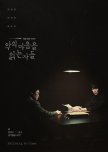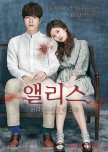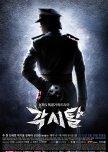
Very early, the drama establishes a strange, even cruel dissonance between its characters and its direction: while the former cares first and foremost about the victims and their families, the latter constantly interjects with scenes of criminals preparing, accomplishing and rejoicing about their murderous deeds. Those segments prove both lengthy and recurring: from the beginning to the end, never are we spared from their night prowling, their chilling excitement, their violence. Although the gore is blurred and the killings themselves omitted - stopping short of the blow -, I found that fascination with the acts jarring… and quite reminiscent of the media-induced voyeurism denounced by the characters.
In a telling moment, a reporter is praised for her refusal to seek gruesome details, replacing them with a tribute towards the victims, identifying them as individuals with families, professions and hobbies and not simply abused, dead bodies. Yet that instant is but fleeting: soon the killers grace our screens again, gleeful, while the victims remain footnotes, worthy of our time only as prey for those men.
In fact, the series' highlight lies with the various interviews of the killers. From them, it derives the most impressive performances. This bothers me greatly. That those sequences would turn out memorable and compelling was a given; that they would be unmatched by the last episode questions me. Despite the characters' convictions, the drama failed to offer us an overall story meaningful enough, captivating enough to trump voyeurism. There is nothing in the narration sound enough to offset its rotten pull; everything else pales or buckles in comparison.
As much as the actors beautifully portray their roles, the substance behind them is missing. We have intriguing sketches of characters, of relationships… but more? The investigations - the killers, in liberty or in interviews! - monopolise so much screen time, what is left doesn't allow to truly delve into the personalities of the people we supposedly follow. All we get is shallow, underbaked, at times even trite, such as the Nietzsche conversation. In a show concerned with psychology, it should have been the starting point to a greater, more profound depiction of the toll criminal cases take on investigators, as well as the unhealthy interest medias and audiences sustain with depravity. At it stands, a worrying number of characters enter the picture then vanish without holding much narrative weight.
I look back at the time spent with the execution of the murders and wonder what could have been, had it been extended to Song Ha Young instead? If those segments had been less accurate recreations and more him envisioning how it could have unfolded, trying to better understand the minds of the culprits… thus tying the investigation with interrogating how far - how low? - must he go to help catching them. In other words: illustrating intimately the characters' turmoil in place of this disconnected, distant stance where their conflicts unfold in brief, offhanded conversations, each months apart.
To me, the suspense was misattributed to the fact of catching the culprits where it could have reposed on Song Ha Young's profiling reports and comprehension of the killers' psyche. Hence, countless scenes of women being stalked and murdered, of their assassins maniacally smiling; hence, out of place, pompous music to accompany tense sequences; hence, the glossing over of the characters' thoughts beyond the surface. Those elements can be found in many other thrillers and often, better done; furthermore, the use and reflection of real events made such attempts at tension wasteful.
This flaw frustrates me the most: not seizing what would have elevated it among myriads of other crime series, that is, heartfeltness and a cast to be commended. Though the writing felt underdeveloped, though the framing felt too remote, the actors still brought to life their characters in a credible manner. Perhaps overly so and the quality of their performances misled in expecting more… regardless, it is what kept me engaged. In particular, Kim Nam Gil's remarkable portrayal of Song Ha Young. If I were to single out one reason to recommend or remember the drama, it would be him, and him alone. What a refreshing and endearing male character! In a sea of male arrogance, egocentrism, loudness and violence, what a relief! I wish more fictional men resembled him.
(Sidenote: what a bunch of unsubtle, distasteful product placements…)
Was this review helpful to you?

Eerie, dreamlike and thought-provoking.
At first this movie disconcerts, as it depicts the blurred reality of the heroine: dreams and awake moments flowing together, laced with nightmares and buried memories. The events follow a dreamer's logic: out of sequence situations, surroundings changing suddenly, people appearing and vanishing from one place to another, bits repeating, strange and surreal conversations... once it is understood, however, one appreciates how deftly this is conveyed, alternating between troubling imagery and touching instants. Wonderland, indeed.Dark truths lies in the heroine's subconscious and cause her nightmares; yet, strikingly, the story never stoops to voyeurism. Elsewhere, it would be a straightforward and sordid affair, laid out for cheap shock value - here, it is handled with empathy and delicacy. Instead of revelling in its most controversial elements, the movie employs them as vehicles for further characterisation. From a disturbing tragedy, it achieves actual beauty.
The last point I would laud most; and I will strive to remember how moved, how inspired I was left by the end, both as the audience and a potential creator, for it is far from easy to elevate a story like so.
A few flaws have to be mentioned, though.
In order to replicate the heroine's dreamlike state, the movie sacrifices her agency and emotivity in a way that slightly hampers our connection to her. It also has her - and the handful of secondary characters, such as her aunt - meander a little too much, especially in the lengthy introduction before she finally arrives to Wonderland. I believe giving her a clearer goal, as well as stronger emotions, wouldn't have detracted too much from the narrative and could have lent a needed punch to some scenes.
Moreover, I found the secondary characters clumsily grafted to plot: the aunt is moving in her worry, yet ultimately superfluous to the heroine's journey. Similarly, the individuals involved in the backstory appear so late, they aren't as fleshed out as they could - and should - be. An unifying thread misses still: those characters, as well as the ones featuring in the introduction, fail in neatly wrapping together all of the movie's layers.
These aspects prevent it from being a complete success in my eyes, but not from being a very interesting discovery.
Was this review helpful to you?

This review may contain spoilers
Fun turned farcical.
At first, this drama's promise is simple: delightfully corny entertainment against an intriguing historical backdrop. With swift efficiency, it sketches characters with touching - and even thought-provoking - conflicts tied to the troubled times it takes place in. Curiosity piqued, hope soon follows: could this overdramatisation serve in painting a more profound picture of the period and its people?Alas, the hand that deftly outlined this compelling context proves just as quick in quashing it, soon unveiling where its true loyalty lies: with cheap writing and unsavory values.
In the 30s, as Japan controls Korea, a masked figure mocks the occupying force and sows seeds of sedition among the subjugated locals. On the trail of this heroic figure, we find our own: an ambitious and ruthless Korean man enrolled in the imperial police. Though disowned by his countrymen and distrusted by his colleagues, desperation to escape poverty drives him. By his side, few friends, with one of interest: a gentle Japanese teacher, admirative of Korean culture albeit from a typical military family. It is a straightforward and effective setup, rife with turmoil and torn identities.
Yet in spite of its solid concept, Gaksital suffers from an incredibly incoherent narrative in which no character, no development, no situation ever arises from a sensible perspective. Rather, it sticks to a shoddy script which substitutes itself to the laws of space, time, human physiology and psychology. What the script dictates becomes reality, in a bizarre and mystifying parody of verisimilitude: the plot, all-powerful and arbitrary, bends the characters' intelligence and psyche, teleports them where it needs, heals or breaks them as necessary, grafts the required emotions onto them and discards any and every element in its way, including what was previously established.
Thus, our very nominal hero swings from an extreme of frustration and violence to one of rebellion and selflessness, while very flimsy justifications are given: familial duty, inherent goodness and empathy, innate Korean pride… none of it seamlessly reconciles with his early rage and disdain, the sheer magnitude of his misdeeds; none of it accounts for the injustice of a society that pushed him into this traitorous impasse. Instead, the narrative childishly posits all crimes as forgiven through acts of zealous patriotism. So the Korean characters, despite their past grudges and jealousies, despite the many doubts they should harbour, happily embrace each other as comrades, no question asked.
More egregious is the case of the hero's Japanese friend, falling victim to what amounts to a personality transplant. He, too, converts from one excess to another, from cordial to cruel, in a mirror yet not less inexplicable trajectory. Familial duty once again gets invoked, plus a dash of genetic evil - how to view it otherwise, when all Japanese are evil minus one, granted with the dubious privilege of idiocy? -, in a manner that vexes reason. We should believe, yes, in the triumph of filial devotion in a man with strained relations towards his relatives; and we should believe it strong enough to shatter friendships that he cherishes more than family. In this contrived way, he rises as a villain against our hero: their rivalry, instead of heartbreaking, seems phony.
To seal the deal, so to speak, the drama employs romance: a rebel woman loved by both men. As one has come to expect from fictional heroines, the poor soul turned out to be another sham - a passive object the men strive to possess and passed on between them, captured, freed, captured, freed! a fate she endures, patiently worrying for the men close to her when she's not tasked with the brave, rebellious act of… cooking for said men. Already, the insignificance of her role appals; the blend of romance utterly infuriates, for what is there to admire, to adore? What Gaksital puts forward as explanation leaves one stunned: our love story stems from a teenage crush. For both suitors and the lady involved, the great basis to their infatuation comes from the very first flutter of fascination felt for the opposite sex. The series holds this as not only plausible, but so powerful it absolves of abuse inflicted without knowing the other's identity; so powerful it becomes obsession and trumps, just like filial devotion, friendships that were made tangible.
As we witness these baffling developments, we must also wince from the poor logistics of them! Torture is but a scratch: no amount of beatings, whippings, slashings or bombings is able to diminish the characters… unless, of course, it befalls a doomed secondary one, then the body suddenly succumbs for quick shock value. Time flows in debatable measures, dilated as much as can be in order to let the hero get away, swaps clothing, then sneaks back; the police always vanishes and tarries when the good guys need a moment to flee. Likewise, intellects fluctuate to a concerning degree - the beatings, perhaps? - as friends and foes ponder on the very evident clues before them or abruptly connect two inconclusive pieces of information.
And that is, still, far from the complete picture, teeming also with a conveniently appearing horse, flushed out rebels freed after a good session of torture - this will teach them? -, a secret independence movement recruiting in the open and a villainous organisation which actions and goals, by the end, made neither sense nor a captivating antagonistic force.
Consequently, on screen, the actors embody not human beings but puppets: uprooted from their personal history and material circumstances, untethered from their relationships or beliefs, thus unsettled in their quirks and what could constitute their personality. Constantly diminished by the erratic script, the often capable performances of the (main) actors never fully convince, only entertain. How could they? On a whim, their characters switch from sweet to violent, indifferent to affectionate, sly to silly and back again, and back again, in a revolving motion that leaves their already poorly sourced motives in shambles.
Damning it further are the continuity errors and set oddities cropping up between every other sequence: to close one's eyes on the miraculous healing power of our heroes is one thing, to have it highlighted through wrongly placed wounds is another… the details, one by one, add up: differently positioned props between cuts, misadjusted or unbloodied clothing, styles of questionable accuracy, various cheesy effects, the obviously limited backlot and not less confusing layouts of interiors. What would have been forgiven elsewhere, here chips at it more - puppets or perhaps worse, characters of cardboard hastily shipped from room to room, dents and flaking visible.
Insult to injury, the series boasts a miserably high number of episodes for what it knows to offer. Deprived of the strength of nuanced characters yet unable to provide rich intrigues, the almighty plot runs in circles: a few key situations, ad nauseam - a damsel to distress then undistress, a round of our male duo warily eyeing each other, Gaksital! saving the day, rinse, repeat… a permanent standoff, as no radical measure can be utilised before the very last episodes. It feels long and tiring, the beginning thrill fading more and more as episodes pass and neither bring something new nor build something of value.
Gaksital keeps a pretense, one aligned with not only mediocre writing - a lesser crime - but also a deeply conservative worldview.
One slavishly devoted to the authority of the father, his ideals, his beliefs so that honouring his memory and avenging him is a foregone conclusion; and that his political embodiments, as absolutely wise elder teachers, generals or monarchs, deserve the same unquestioned respect.
One blind to the complexities and flaws of Korean society independent to colonial matters, thus portraying a simplistic heroic unity against a villainous Japan; so that the complicated feelings one might develop because of poverty, hierarchy and prejudice are handwaved; and that all characters fall between a caricature of either good or evil, depending on nationality, with no nuance of ideology or morality.
One disdainful of women, their roles, their intelligence, so that they become accessories or fantasy to men, pitiful objects to protect, possess or destroy; and that they happily comply or keep quiet about their fates, always irrelevant and powerless against the politics and the narrative. This, despite their constant and even formative presence in all of these men's lives! laughable.
Hence, a charade: unconcerned with the flawed humanity of its protagonists, unbothered by the superficiality of its arguments but oh, so satisfied with its little patriotic demonstration. Setting aside any expectation of inventive fun and meaningfully crafted narrative, some enjoyment can be derived from its performances and overall ridicule… not enough to wish it on anyone who isn't a die-hard fan of the main actors, though.
Was this review helpful to you?


